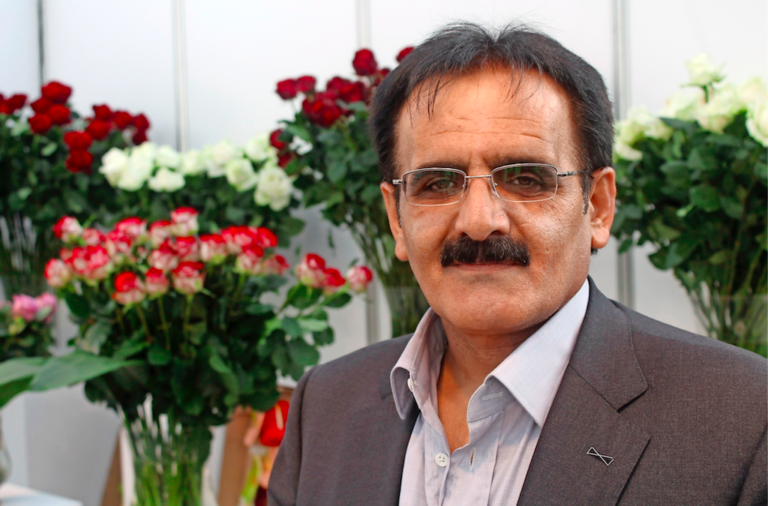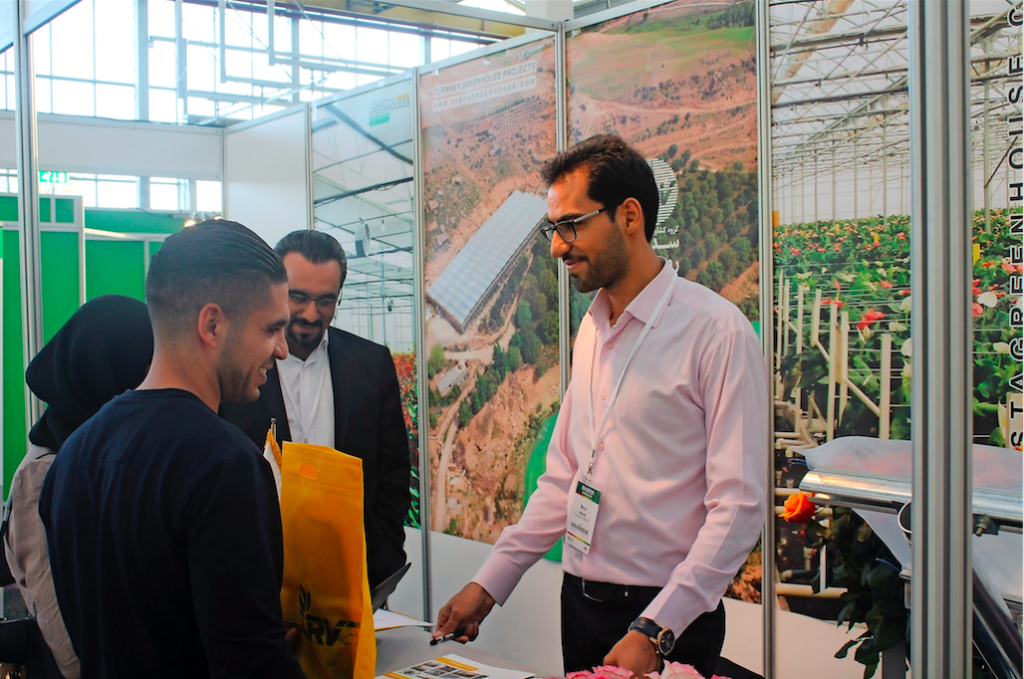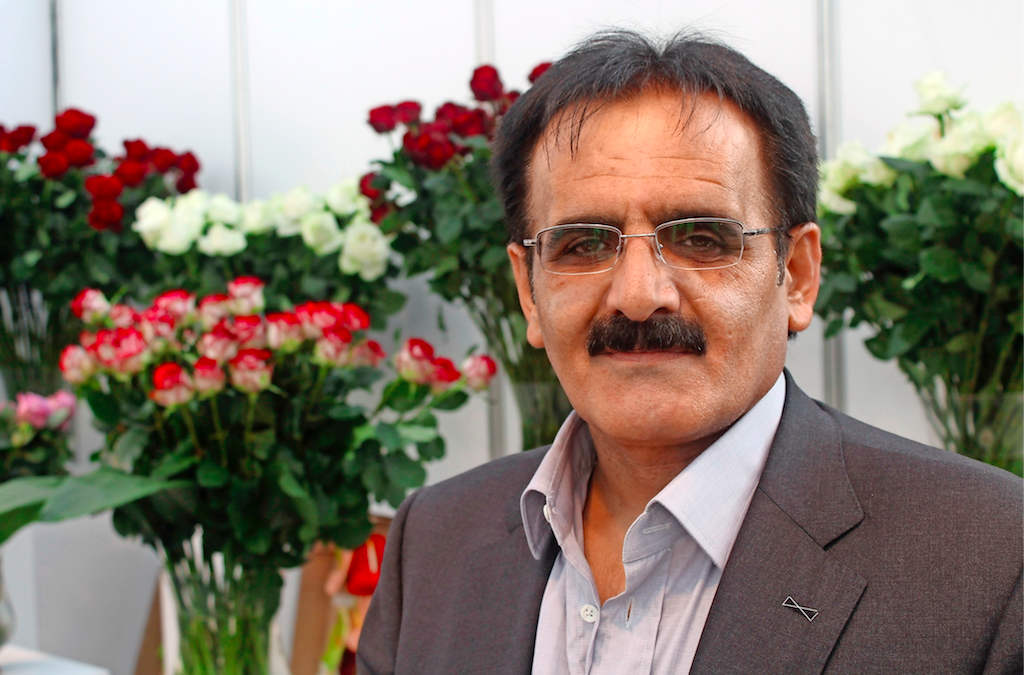
There was a large delegation of Iranian floriculturists at IFTF in Vijfhuizen. Keen to export to Europe. But now that the United States has withdrawn from the Iran Nuclear Deal, the export of Iranian flowers to the West seems further away than ever before. On top of that, the import of products, including propagation materials, to Iran has come to a complete halt. “The American sanctions affect everything in our country.”
By Arie-Frans Middelburg
In 2015, the European Union, United States, Russia, China and Iran signed the Iran Nuclear Deal, which came into effect in 2016. Iran promised to stop its nuclear weapon programme. In return, some of the sanctions that had previously been imposed on Iran by the countries, were suspended. Last May, American president Donald Trump withdrew from the agreement. Since then, the export of propagation materials for plants and flowers from Europe and other places has come to a standstill.

Very complicated
The export of Iranian products to the West, as well as exports to Iran, were already very complicated before Trump withdrew from the agreement, because America’s primary sanctions were never suspended. America’s primary sanctions on Iran apply to American people and companies (and their foreign branches), as well as all people and organisations based in the USA. They aren’t allowed to engage, or be involved in any way, in transactions with Iranian parties. They aren’t allowed to invest in anything in Iran, or trade in Iranian oil, gas or petrochemical products, is how it’s explained by Rabobank.
In addition to these primary sanctions, it was always logistically challenging for Iranians to export and it required a lot of paperwork. Iranian banks weren’t cooperating either. As for imports: the import of plants and flowers was prohibited in Iran. The import of propagation materials, on the other hand, was allowed. Some breeders managed to build up a good relationship with Iranian growers and have been doing business with them for a few years now.
Good hope
For a long time, there was good hope that it would soon become easier to export to Iran and that it would become possible for Iranians to export to the West. Iran also offered great potential for suppliers. This was visible at the international Green Trade Fair organised in Tehran by HPP Exhibitions the past two years. It was the place for greenhouse builders and breeders to introduce themselves to the Iranian floricultural industry.
The trade fair still took place last April, but a month later, all hope for an improved trade relationship between Iran and the West was lost. The USA withdrew from the nuclear agreement in May. Since then, secondary American sanctions apply as well. They also apply to non-American people or companies. One of the things that are prohibited now are payments in American dollars from and to Iran. As a result, dollar transactions between Iran and other countries are no longer possible. Banks with branches in the US, as well as banks outside it, greatly fear American repercussions, so they no longer facilitate money transactions with Iran.
Complete standstill
The secondary sanctions have led to a complete standstill of exports of propagation materials to Iran, confirms Pierre van den Enden. The Sakata business development manager is responsible for their exports to Iran. Sakata no longer has any business in Iran and neither do any other suppliers.
Tjerk Vening for example, account manager with Könst Alstroemeria, confirms this: “From May, and before that actually, from the moment the USA announced they were going to withdraw from the agreement, our exports to Iran hit zero. All because of the problems with money transactions. That was never easy, but it really has become a non-starter. We’re missing out on a lot of turnover.”
Great ambitions
The American sanctions are detrimental for the ambitions that the Iranian government has for the country’s floriculture industry. Dr Pejman Azadi of the department of genetic engineering and biosafety told us at IFTF that the current acreage of potted plants and flowers in Iran is 7,000 ha. Half of that is flowers, the other half pot plants. “2,500 ha is in greenhouses, and the rest is outdoors. The government wants to expand the acreage to 40,000 ha. That’s including fruit and vegetables, though”, according to Azadi.
He feels that scale-enlargement is needed to be able to ship large volumes. That will make Iranian flowers price competitive. Exports are currently limited to neighbouring countries; the volumes are too small for destinations further afield. To be able to expand their acreage, Iran could do with some support from abroad. Azadi: “I don’t just mean money, but knowledge too.”
Azadi is completely aware that the idea of exporting flowers from Iran to Europe is not realistic at the moment, although, according to him, they are exporting some Red Willow and dried flowers to this continent. “The sanctions imposed by the United States are affecting everything. It’s extremely difficult to transfer or receive any money at all.”
Rose exports
One of the growers who would like to export is Ali Hassani. He’s got 1 ha of roses in Shiraz province. He sells most of his produce locally at the moment. With 90 million inhabitants, the Iranian market is huge.

However, the American sanctions have an impact on the country’s economy too. That’s because they’re aimed at some of Iran’s most important sectors, including the financial sector (banks, insurance companies, capital market), civil aviation, the automotive industry, shipbuilding and maritime transport, port authorities, petrochemical companies, the energy sector and the crude-oil trade, various minerals and semi-finished products, precious metals and the food industry.
The sanctions have led to a depreciation of the Iranian currency, the rial. “Iran has a large rose production. The domestic market isn’t large enough”, says Hassani.
The question is whether Hassani will still be able to get propagation materials. “Transferring money is impossible. There isn’t a single bank in Iran that can do it. That leaves me with two options. One is to start a business in the Netherlands and transfer money from there, and the second one is to deliver the money in cash.” Hassani says he’s currently doing the latter. Fact is, imports have become more expensive for Iranian growers, due to the depreciation of the rial. “It motivates growers to produce their own propagation materials. I guess that in a way, that’s a positive outcome of the sanctions”, says Azadi.
Large greenhouse builders
It isn’t just the Iranian government or the flower growers who have ambitions. According to Reza Mohebi of Sadid Rouyesh Vista Agro-Industrial Group, there are ten to twelve large greenhouse builders in Iran that are focused on the domestic market as well as foreign countries. His company is one of them. The number of greenhouses in the country has steadily been growing in recent years, according to Mohebi. The current acreage amounts to around 8,000 hectares, mostly filled with vegetables. Most of the companies are 1-to-2-ha family businesses.
Mohebi sells turn-key projects within Iran, as well as in nearby countries like Uzbekistan and Georgia. “We’d like to get into the Spanish and the Dutch markets too, but that isn’t possible. We’re interested in exporting and that’s why we’re here”, explained Mohebi. His trip to the Netherlands was not in vain, either. There were many Ethiopian and Kenyan companies at IFTF, and he explained that money transfers between Iran and the East-African countries isn’t a problem.
For now, the Iranians can only hope that things will improve soon, both with regards to their own economy and with regards to the imports and exports from and to the West. One thing that might give them hope is the fact that China, Russia and the European Union condemned the American sanctions; they want to continue doing business with Iran. They’re working on an alternative payment system, so that they can go around the sanctions against the banking system. But so far, they haven’t yet found a country willing to facilitate the transactions with Iran.
Hassani believes that he will be able to export his roses one day. “In five years’ time, I should be able to ship flowers to the auction in Aalsmeer without any problems. And by then, I’ll have expanded enough to export the required volumes, too.”
